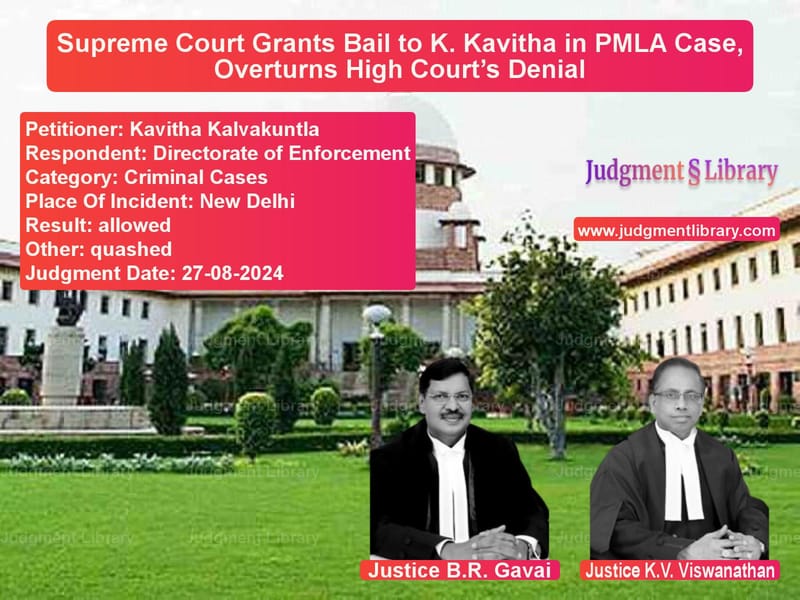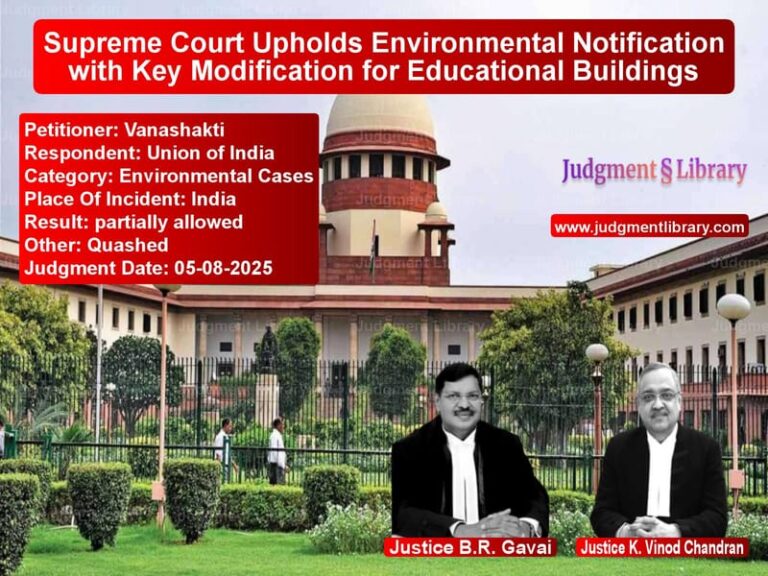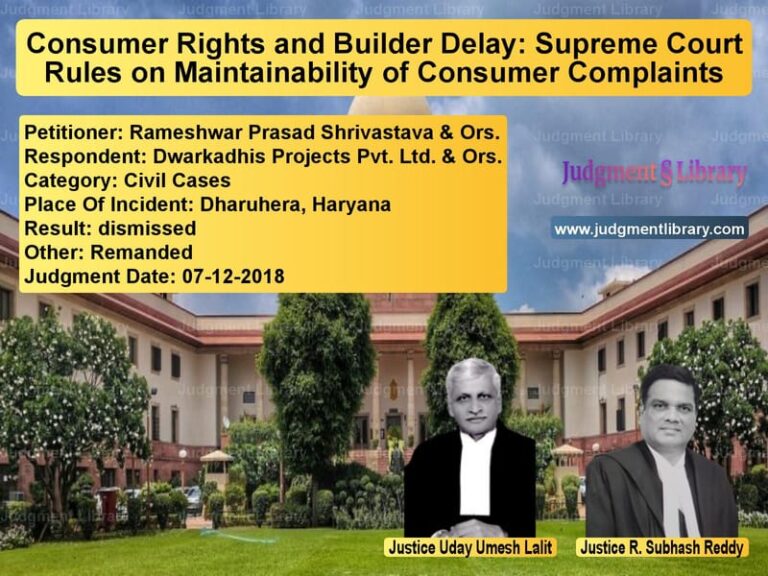Supreme Court Grants Bail to K. Kavitha in PMLA Case, Overturns High Court’s Denial
The Supreme Court of India has granted bail to Kavitha Kalvakuntla, the daughter of Telangana Chief Minister K. Chandrashekar Rao, in connection with the Prevention of Money Laundering Act (PMLA) case, overturning the Delhi High Court’s earlier refusal. This judgment not only discusses the specifics of the PMLA but also addresses the special treatment of women under the law.
Background of the Case
The case involves allegations that K. Kavitha was involved in a money-laundering conspiracy related to the Delhi Excise Policy case. The Enforcement Directorate (ED) initiated an investigation into the matter, which led to the arrest of several individuals, including Kavitha, for allegedly facilitating the payment of bribes through illegal channels. The charges stem from her alleged involvement in a larger political conspiracy involving the Delhi government’s excise policy and corruption surrounding it.
On July 1, 2024, the Delhi High Court denied Kavitha bail in the money-laundering case, citing her involvement in tampering with evidence and influencing witnesses. Kavitha had been behind bars for over five months before this appeal was filed before the Supreme Court.
Legal Issues
- Whether Kavitha is entitled to bail under the special provisions for women under Section 45(1) of the PMLA despite the serious charges against her.
- The applicability of the proviso to Section 45(1) of the PMLA for women accused of money laundering and whether she qualifies for its benefit.
- The potential for judicial overreach by the lower courts in applying the law and denying bail based on the evidence presented during the investigation.
Petitioner’s Arguments
Represented by Senior Advocate Shri Mukul Rohatgi, the petitioner, Kavitha, made the following points:
- Despite the serious allegations, no proceeds of crime were recovered from the appellant, which should weigh in favor of granting bail.
- The charges were based on testimonies of co-accused and witnesses, many of which were retracted or lacked credibility, and should not be the sole basis for denying bail.
- There were approximately 493 witnesses to be examined and around 50,000 pages of documents to be considered, making a quick resolution of the trial unlikely. This prolonged trial would be prejudicial to her fundamental rights, particularly the right to liberty under Article 21 of the Constitution.
- She was a prominent political leader and a woman, thus entitled to the special treatment provided under the proviso to Section 45(1) of the PMLA.
Respondent’s Arguments
The Enforcement Directorate (ED), represented by Shri S.V. Raju, opposed the petition on the grounds of:
- There was significant evidence, including testimonies and documents, suggesting Kavitha’s involvement in the conspiracy. The statements made by the co-accused and witnesses implicated her in the unlawful activities surrounding the excise policy.
- The fact that Kavitha allegedly tampered with her mobile phone to destroy evidence showed her attempt to evade justice, which was grounds for denying her bail.
- While the provisions of the PMLA provide special consideration for women, the seriousness of the charges and the risk of witness tampering outweigh the need for bail.
Supreme Court’s Observations
The Supreme Court made several key observations during the hearing:
- The Court appreciated the submissions by the Attorney General and noted that the principles of judicial restraint should be observed when dealing with high-profile political figures.
- While it acknowledged the provisions of Section 45(1) of the PMLA, the Court emphasized that the law should not be interpreted narrowly and should be applied based on the circumstances of each individual case.
- The Court also observed that bail is the rule, and refusal is the exception. This principle remains paramount in ensuring that pre-trial detention does not amount to punishment.
- The Court further clarified that the proviso to Section 45(1) of the PMLA, which allows women to be considered for bail, does not automatically preclude a woman from being granted bail if there is credible evidence against her.
Final Judgment
On August 27, 2024, the Supreme Court delivered its judgment:
- The Court set aside the High Court’s refusal to grant bail and directed that Kavitha be released on bail, subject to the conditions outlined below.
- The Court emphasized that, in light of the fact that the investigation was complete, further custody was unnecessary.
- It also invoked the special provisions under Section 45(1) of the PMLA, acknowledging Kavitha’s gender and the fact that she had not been implicated with direct recovery of crime proceeds, granting her the benefit of bail under the proviso.
- The Court required Kavitha to provide bail bonds in the sum of INR 10,00,000/- for each of the two cases she was charged in and also mandated her to deposit her passport with the trial court and refrain from tampering with evidence or influencing witnesses.
- The Court reiterated that the right to a fair trial and the constitutional right to liberty must not be overshadowed by procedural constraints and that prolonged pre-trial detention should be avoided unless there are compelling reasons.
Implications of the Judgment
This judgment has significant implications for cases under the PMLA and how courts treat bail applications in cases involving high-profile political figures:
- Special Provisions for Women: The Court’s ruling underscores the need to apply the proviso to Section 45(1) of the PMLA judiciously, taking into account the gender of the accused while also considering the gravity of the charges against them.
- Judicial Precedent on Bail: The judgment reaffirms the principle that bail should be the rule, not the exception, and that the constitutional right to liberty must be upheld, especially in cases where prolonged detention is not necessary.
- Impact on Political Figures: The ruling also highlights the delicate balance courts must strike when dealing with the release of political figures facing serious charges, particularly in cases involving corruption and money laundering.
Case Comparison
Similar cases have addressed the interplay between the rights of the accused and the provisions of the PMLA:
- Manish Sisodia v. Directorate of Enforcement (2024): The Court examined the need for bail in cases of serious allegations under the PMLA, particularly where the accused is a public figure.
- Saumya Chaurasia v. Directorate of Enforcement (2024): The Court highlighted the special consideration for women and persons of tender age in criminal cases under the PMLA, noting the need for judicial discretion in such matters.
Conclusion
The Supreme Court’s decision to grant bail to Kavitha Kalvakuntla is a crucial judgment in the context of the Prevention of Money Laundering Act. By acknowledging the special provisions for women and ensuring that Kavitha’s right to liberty is preserved, the Court has reinforced the principles of fairness and justice. This case serves as a reminder of the delicate balance between the legal rights of the accused and the judicial system’s duty to uphold the rule of law.
Petitioner Name: Kavitha Kalvakuntla.Respondent Name: Directorate of Enforcement.Judgment By: Justice B.R. Gavai, Justice K.V. Viswanathan.Place Of Incident: New Delhi.Judgment Date: 27-08-2024.
Don’t miss out on the full details! Download the complete judgment in PDF format below and gain valuable insights instantly!
Download Judgment: kavitha-kalvakuntla-vs-directorate-of-enfor-supreme-court-of-india-judgment-dated-27-08-2024.pdf
Directly Download Judgment: Directly download this Judgment
See all petitions in Money Laundering Cases
See all petitions in Bail and Anticipatory Bail
See all petitions in Public Interest Litigation
See all petitions in Fraud and Forgery
See all petitions in Judgment by B R Gavai
See all petitions in Judgment by K.V. Viswanathan
See all petitions in allowed
See all petitions in Quashed
See all petitions in supreme court of India judgments August 2024
See all petitions in 2024 judgments
See all posts in Criminal Cases Category
See all allowed petitions in Criminal Cases Category
See all Dismissed petitions in Criminal Cases Category
See all partially allowed petitions in Criminal Cases Category







